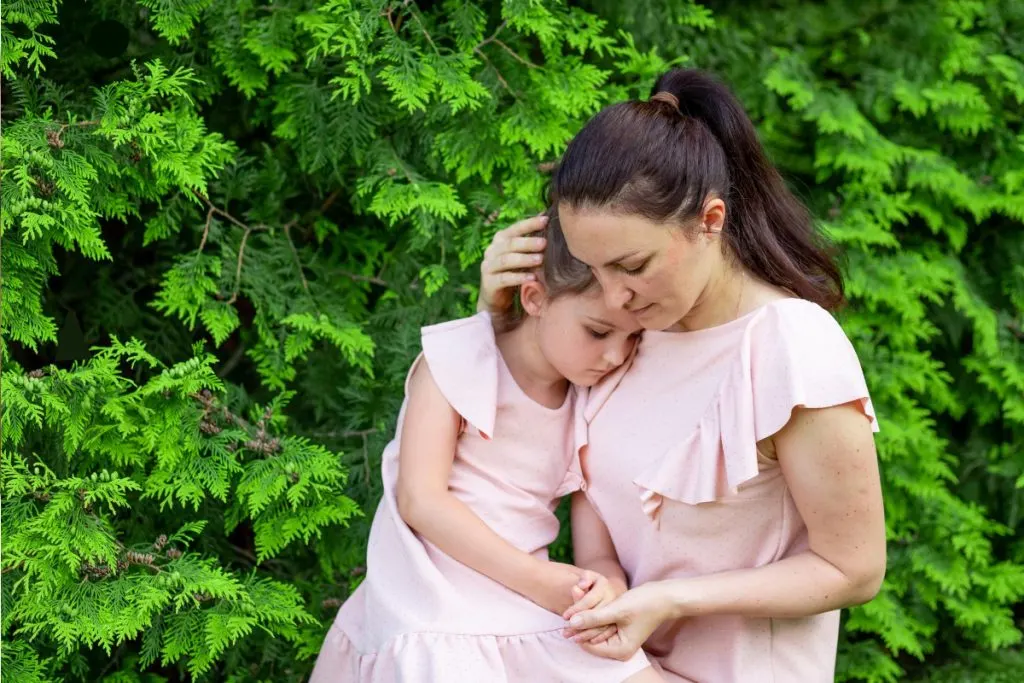- What is Montessori parenting
- What Montessori parenting is not
- How to be a Montessori parent
- How to use
TABLE OF CONTENTS
What is Montessori Parenting?
Montessori parenting originates in Dr. Maria Montessori’s teachings in the 1900s. Montessori believed that the environment should encourage exploration. She believed education should be experiential and that a child’s environment should be conducive to the whole child’s development.1
The Montessori way of raising a child is unique in that it emphasizes a child is a person and we should provide an environment with their needs in mind. It emphasizes learning through discovery.
In other words, the child is allowed to make mistakes and not be punished for their mistakes. Montessori believed that children should be allowed to explore their world without being controlled by adults. Each child has a unique gift that must be nurtured and developed.

What Montessori parenting is not
Due to the education system’s success, some Montessori educators feel that having a consistent home environment that applies similar theories would benefit young children.
Parents of children who attend Montessori schools are encouraged to use parenting practices derived from Montessori principles at home.
Therefore, the Montessori parenting method was not created by Dr. Montessori.
It is not a prescribed way of parenting.
However, keep in mind that no credible research can be found to prove or disprove the benefits of this modern approach to parenting.
How to be a Montessori parent
Here are the principles of Montessori that influenced the Montessori method of parenting.
Provide a child-friendly environment to promote independence
Human beings inherently want to be independent. Autonomy is a universal human need.
In schools, a Montessori classroom is set up so that children are free to walk around, access learning materials on low shelves, and return them afterward without the assistance of adults.2
Therefore, the Montessori parenting approach also encourages children’s freedom and independence.
Provide a child-proof and child-friendly environment, so children are not confined in cribs or playpens.
Even at a young age, younger children are allowed to explore freely.
Older children are given the responsibility to maintain their own space.
If it is not safe to allow your child to access the entire house by themselves, use their bedroom or choose a dedicated play space for them.

Be a role model
A child’s mind is absorbent, according to Montessori.
Children learn quickly from adults by unconsciously absorbing information from the environment.3
Every early life experience is significant.
The impressions on the child’s mind shape and form who they are.
That is, your behavior will affect your children either for the better or the worse, depending on what you do.
If you’re intentional about your role as a parent, you can make a big difference in your child’s life.
Give mutual respect and freedom of choice
Showing mutual respect and courtesy are also the characteristics of the Montessori philosophy.
In addition to developing academic and social skills, the Montessori method of education also promotes the development of moral and spiritual values.
It emphasizes the importance of cooperation, collaboration, mutual respect, trust, and love.4
In a Montessori home, parents are respectful to everyone, including their children, to model the true meaning of respect.
Respect can come in many different forms.
For example, you can respect a child’s preferences for certain things in daily life. We don’t all like the same thing.
If it’s not a matter that can hurt anyone, give the child choices.
Discipline combined with logical reasoning and problem solving
Discipline children by teaching them to think critically and solve problems instead of punishing them. This is called inductive discipline.5
Among Montessori’s beliefs was that education could eliminate war through developing critical thinking, creative problem-solving, and the moral values of responsibility and respect.
People with independent thought can distinguish right from wrong by analyzing and reasoning, so they don’t blindly follow others’ wishes.
Problem-solving teaches them to find solutions to problems instead of using force and intimidation.
Get the most out of sensitive periods
Discovered by Montessori and later confirmed by neuroscience, a sensitive period is a time when children are sensitive to stimuli.
They are more susceptible to acquiring certain senses or skills.
Parents can get the most out of this period by exposing children to different experiences and stimuli to learn new skills.
For instance, childhood is the best time for a child to learn a new language6 and master emotional regulation skills.7
Immersing children in a speech-rich environment exposes them to a new language’s sounds, rhythms, and grammar.
Creating a positive family climate can help children develop emotional regulation.

Let children learn through play
Montessori believed that children learn through doing and playing, not being given instructions.
Playing is an enjoyable, voluntary, purposeful, and spontaneously chosen activity for children.
It is a great way to learn problem-solving, new social skills, new language, and new fine motor skills.8
Play can also take many forms.
Things in daily life, such as food preparation and clothing choices, are learning and playing opportunities.
Instead of teaching with lectures or flashcards, parents can use activities in everyday life to teach practical skills.
Nurture self-motivation
Children are innately curious explorers.
They want to explore, discover, and learn about the world. It is not necessary to use incentives such as rewards or punishment to make them learn.
The process of discovering and learning is a reward in and of itself.9
The best way parents can get children to learn is to provide them with opportunities to explore and be exposed to new things and ideas.
Make learning a fun activity rather than a chore.
Nurture their love for learning intrinsically so they are self-motivated to achieve in school.
How to adopt Montessori parenting style
Child psychologists Diana Baumrind, Maccoby, and Martin discovered that there are four styles of parenting:
- Authoritative parenting
- Authoritarian parenting
- Permissive parenting
- Uninvolved parenting
Among these four parenting methods, the authoritative parenting style is the best.
Montessori parents are generally flexible and have a strong sense of respect for their children’s autonomy.
Montessori style parenting is an authoritative parenting style.
According to research, the authoritative style consistently produces good outcomes in children across the globe10.
Therefore, adopting the Montessori parenting style will also likely benefit a child’s development.
Keep the following in mind when adopting this parenting style.
Use common sense
While Montessori believed that children should be given complete freedom to choose and move, she didn’t let them do that in an unsupervised or unsafe environment.
So, it doesn’t mean parents should let children roam around the kitchen and play freely with knives or fire.
Parents must use their judgment and common sense when applying these parenting practices and setting up a safe Montessori environment for kids.
No expensive toys needed
Montessori believed children should have educational toys that helped them learn about the world.
Ultimately, she wanted to teach children practical life skills that allowed them to become independent.
You can use any tool that your child can handle safely as a teaching tool.
Your child doesn’t need expensive toys made from natural materials to benefit from this parenting approach.
References
- 1.Montessori M. The Advanced Montessori Method. Vol 1. Frederick A. Stokes Company; 1917.
- 2.Cossentino J. Ritualizing Expertise: A Non‐Montessorian View of the Montessori Method. American Journal of Education. Published online February 2005:211-244. doi:10.1086/426838
- 3.Kundakovic M, Champagne FA. Early-Life Experience, Epigenetics, and the Developing Brain. Neuropsychopharmacol. Published online June 11, 2014:141-153. doi:10.1038/npp.2014.140
- 4.Edwards CP. Three approaches from Europe: Waldorf, Montessori, and Reggio Emilia. 4. 2002;1(1). https://eric.ed.gov/?id=ED464766
- 5.Krevans J, Gibbs JC. Parents’ Use of Inductive Discipline: Relations to Children’s Empathy and Prosocial Behavior. Child Development. Published online December 1996:3263. doi:10.2307/1131778
- 6.Oyama S. A sensitive period for the acquisition of a nonnative phonological system. J Psycholinguist Res. Published online July 1976:261-283. doi:10.1007/bf01067377
- 7.Luby JL, Belden A, Harms MP, Tillman R, Barch DM. Preschool is a sensitive period for the influence of maternal support on the trajectory of hippocampal development. Proc Natl Acad Sci USA. Published online April 25, 2016:5742-5747. doi:10.1073/pnas.1601443113
- 8.Broadhead P. Developing an understanding of young children’s learning through play: the place of observation, interaction and reflection. British Educational Research Journal. Published online April 2006:191-207. doi:10.1080/01411920600568976
- 9.Deci EL, Koestner R, Ryan RM. Extrinsic Rewards and Intrinsic Motivation in Education: Reconsidered Once Again. Review of Educational Research. Published online March 2001:1-27. doi:10.3102/00346543071001001
- 10.Nyarko K. The influence of authoritative parenting style on adolescents’ academic achievement. AJSMS. Published online September 2011:278-282. doi:10.5251/ajsms.2011.2.3.278.282
